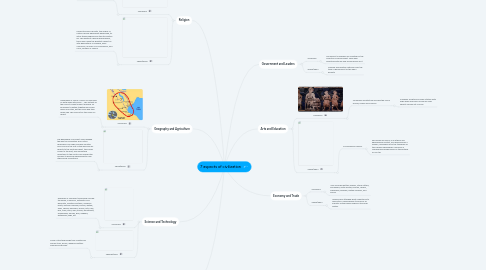
1. Religion
1.1. Sumerians
1.1.1. practiced polytheism, or the worship of many Gods. They believed that God controls all natural forces.
1.2. Shang/Zhou
1.2.1. During the Zhou dynasty, the origins of native Chinese philosophy developed, its initial stages beginning in the 6th century BC. The greatest Chinese philosophers, those who made the greatest impact on later generations of Chinese, were Confucius, founder of Confucianism, and Laozi, founder of Taoism.
2. Science and Technology
2.1. Sumerians
2.1.1. Examples of Sumerian technology include: the wheel, cuneiform, arithmetic and geometry, irrigation systems, sumerian boats, lunisolar calendar, bronze, leather, saws, chisels, hammers, braces, bits, nails, pins, rings, hoes, axes, knives, lancepoints, arrowheads, swords, glue, daggers, waterskins, bags, etc.
2.2. Shanhg/Zhou
2.2.1. some of the technology they created are bronze tools, drums, weapons pottery palaces and houses.
3. Geography and Agriculture
3.1. Sumerians
3.1.1. Geography of Sumer. Sumer is surounded on both sides with rivers. ... The fertality of the rich silt is what made it possible for sumerians to gather together and make farms and cities, but the rivers had their down side. The land not by the rivers is a desert.
3.2. Shang/Zhou
3.2.1. The geography of Ancient China shaped the way the civilization and culture developed. The large land was isolated from much of the rest of the world by dry deserts to the north and west, the Pacific Ocean to the east, and impassable mountains to the south. This enabled the Chinese to develop independently from other world civilizations.
4. Social Structure and Family Life
4.1. Shang/Zhou
4.1.1. a member of the indigenous non-Semitic people of ancient Babylonia.
4.2. Sumerians
4.2.1. Sumerian society was thought to have been made up of four social classes: nobles, commoners, clients and slaves.
5. Government and Leaders
5.1. Sumerians
5.1.1. The ancient Sumerians are credited for the invention of government. They were affected politically and economically by it.
5.2. Shang/Zhou
5.2.1. Chinese and Western historians call the type of government of the Zhou dynasty
6. Arts and Education
6.1. Sumerians
6.1.1. Sumerians architecture includes the use of arches, ramps and colomns
6.1.1.1. Sumerian sculpture includes statues with large wide open eyes as well as small objects carved out of irony.
6.2. Shang/Zhou
6.2.1. Confucianism Daoism
6.2.1.1. also known as Ruism, is an ethical and philosophical system, also described as a religion, developed from the teachings of the Chinese philosopher Confucius a Chinese philosophy based on the writings of Lao-tzu
7. Economy and Trade
7.1. Sumerians
7.1.1. Jobs included pottery makers, stone cutters, bricklayers, metal smiths, farmers, fishers, shepherds, weavers, leather-workers, and sailors.
7.2. Shang/Zhou
7.2.1. Shang rulers attached great importance to agriculture. Fishing began to grow as an industry as the people fished in the fresh waters.

